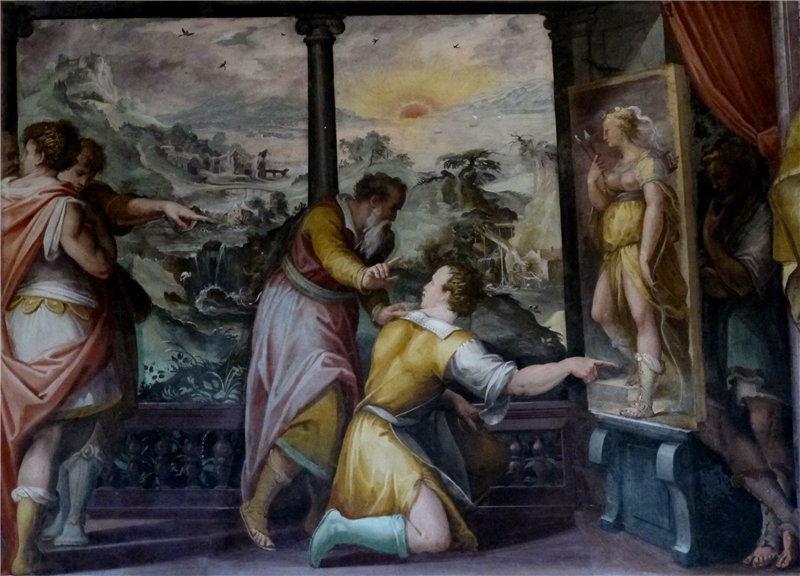Don’t Be An Ultracrepidarian

Apelles the painter rebukes the cobbler that he is not qualified to “judge above the shoe.” (Apelles with the shoemaker, mural by Giorgio Vasari)
Farriers can get annoyed with people that they feel are unjustly criticizing their work. A horse owner may “go on the internet” for a few hours and feel at liberty to offer advice with their newfound knowledge. When a (sometimes well-meaning) non-farrier does this, it makes him or her look ignorant. A customer once said, “In my opinion, any farrier that hot-fits shoes must be a ‘piss-poor’ shoer because they obviously don’t know how to level a foot.” While there may be a few cases where this statement might be true, it is an incorrect and unfair blanket statement. A farrier might hot-fit for a number of reasons like getting a more accurate fit for shoe modifications such as clips or rocker toes. Most farriers that hot-fit are not trying to level the foot with the hot shoe!
An ultracrepidarian [uhl-truh-krep-i-dair-ee-uh n] is a “person who criticizes, judges or gives advice outside the area of his or her expertise” (dictionary.com). The word literally means, “beyond the shoe.” Pliny the Elder supplies the etymology of this word in his Natural History (book 35, published between 76 and 78 A.D). According to the story, a famous painter named Apelles lived in Ancient Greece. One day, a cobbler pointed out that the sole of a shoe in one of Apelles’s paintings was not correct. Though Apelles was a skilled painter, he respected the cobbler’s expertise in what the sole of the shoe should look like. Apelles corrected the painting of the sandal. When the cobbler realized that Apelles had followed his recommendation, he felt validated. With pride, the cobbler began to criticize other parts of the painting that he felt were wrong. Apelles interrupted the cobbler, saying, “Ne ultra crepidam sutor iudicaret!” which means, “A shoemaker should not judge beyond the shoe.” In other words, Apelles was telling the cobbler that he could respect his opinion on shoes, but that the cobbler was not qualified to criticize non-shoe related subjects.
As farriers, we can sometimes make this mistake. A customer might look to you for all kinds of advice about his or her horse. If the subject matter falls outside of your expertise, it is wise to recommend that the horse owner seek advice/services from another equine professional. Even if you know the answer, it is sensible to involve the veterinarian, trainer and other horse specialists. This helps to foster respect between professionals. It can also prevent liability litigation in some cases.
Too often, farriers can be like the cobbler in this story and start to step outside the bounds of their expertise. An example of this is when a farrier offers to give vaccination shots, de-worm horses or float teeth. Just because a person knows how to do these things (and maybe does on their own horses), doesn’t mean that they should perform these services for customer horses. At worst, it is illegal in some states. At best, it is disrespectful to the true professionals. Sometimes a customer might ask you to do some of these things for the horse, but it is best not to be a counterfeit veterinarian.
As professionals, it is important that we respect others. We can do this by sticking to our area of expertise and expecting the same from others. We should study our craft and learn all we can about it and remember to include other professionals when our services are insufficient. Remember that no one likes an ultracrepidarian. Strive to excel in your area of expertise and resist advising the experts of other fields.
Related Posts
-
By Doug Butler, PhD, CJF, FWCF If you want to work with hors...Nov 01, 2018 / 0 comments
-
I was invited by Guy Karsh, a former student, to go to Israe...Dec 21, 2010 / 0 comments
-
Blog Categories
- Anatomy
- Best Business Practices
- Conformation
- Current Events
- Customer Service
- Draft Horse Shoeing
- Equine Soundness
- Essential Anatomy Kit
- Farrier Careers
- Farrier training
- Foal soundness
- Horse Care
- Horse Foot Care
- Horse Owner Tips
- Horsemanship
- Horseshoeing
- Horseshoeing History
- Iron and Forge Work
- Student Spotlight
- Uncategorized
- Veterinary Care
Blog Archives
Contact Us
Butler Professional Horseshoeing School
495 Table Road
Crawford, NE 69339
(800) 728-3826
jacob@dougbutler.com
Subscribe to Our Blog
Get Our Free e-Book!
If you think you want to become a farrier (or know someone who does), this book can help you make that decision. Horse owners will learn the importance of choosing a qualified farrier and how to select the “right” one.
[ Get the e-Book Now! ]
- Follow:
